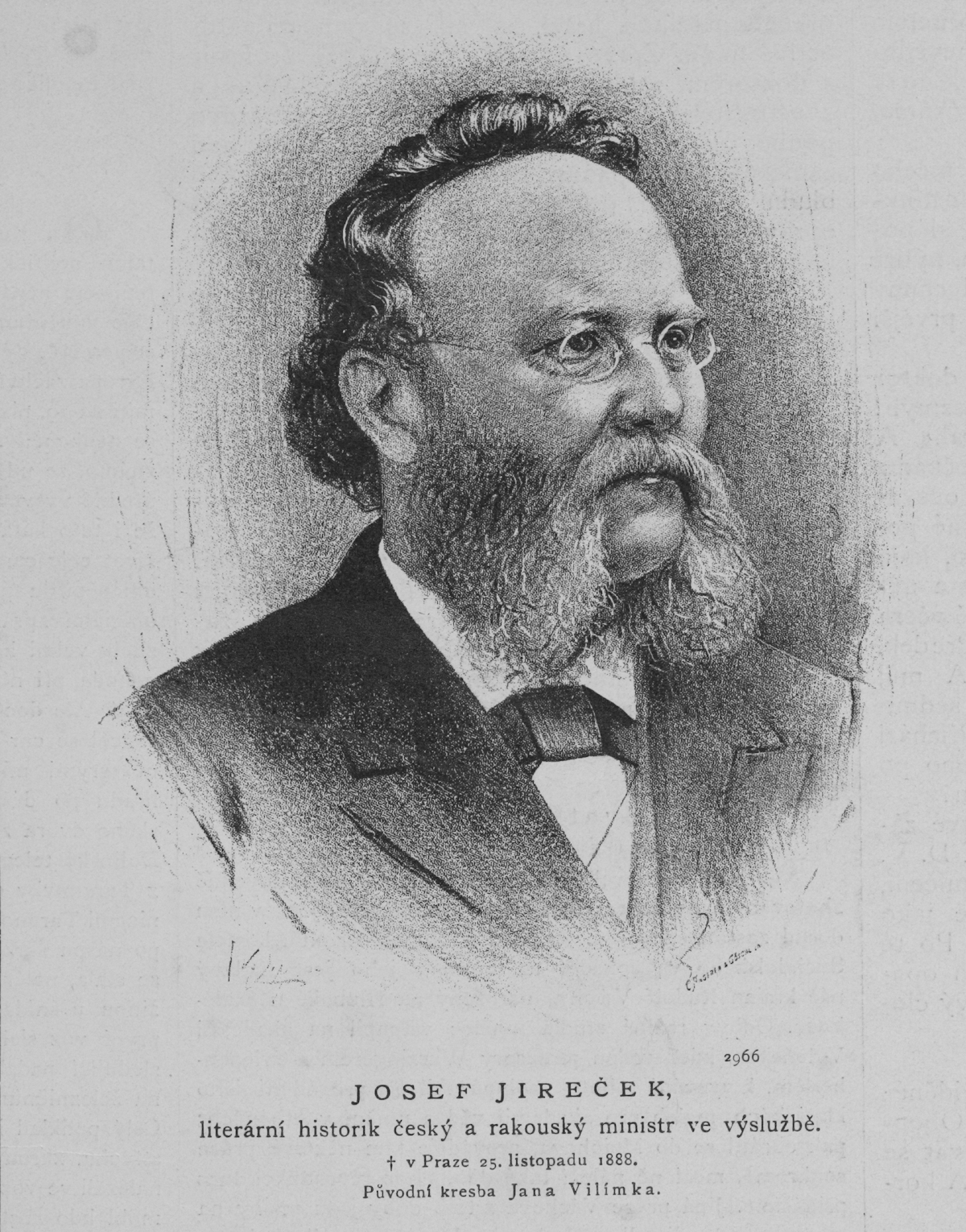Josef Jireček on:
[Wikipedia]
[Google]
[Amazon]
 Josef Jireček (9 October 1825, in
Josef Jireček (9 October 1825, in
 Josef Jireček (9 October 1825, in
Josef Jireček (9 October 1825, in Vysoké Mýto
Vysoké Mýto (; german: Hohenmaut, also ''Hohenmauth'') is a town in Ústí nad Orlicí District in the Pardubice Region of the Czech Republic. It has about 12,000 inhabitants. Its town square is the largest example of its type in the country. ...
– 25 November 1888, in Prague
Prague ( ; cs, Praha ; german: Prag, ; la, Praga) is the capital and List of cities in the Czech Republic, largest city in the Czech Republic, and the historical capital of Bohemia. On the Vltava river, Prague is home to about 1.3 milli ...
) was a Czech
Czech may refer to:
* Anything from or related to the Czech Republic, a country in Europe
** Czech language
** Czechs, the people of the area
** Czech culture
** Czech cuisine
* One of three mythical brothers, Lech, Czech, and Rus'
Places
* Czech, ...
scholar.
He was born in Vysoké Mýto (then part of the Austrian Empire
The Austrian Empire (german: link=no, Kaiserthum Oesterreich, modern spelling , ) was a Central-Eastern European multinational great power from 1804 to 1867, created by proclamation out of the realms of the Habsburgs. During its existence ...
).
He entered the Prague bureau of education in 1850, and became minister of the department in the Hohenwart
Hohenwart is a municipality in the district of Pfaffenhofen in Bavaria in Germany
Germany,, officially the Federal Republic of Germany, is a country in Central Europe. It is the second most populous country in Europe after Russia, ...
cabinet in 1871. His efforts to secure equal educational privileges for the Slav nationalities in the Austrian dominions brought him into disfavour with the German element. He became a member of the Bohemian Landtag
A Landtag (State Diet) is generally the legislative assembly or parliament of a federated state or other subnational self-governing entity in German-speaking nations. It is usually a unicameral assembly exercising legislative competence in non ...
in 1878, and of the Austrian Reichsrat in 1879. His merits as a scholar were recognized in 1875 by his election as president of the Royal Czech Society of Sciences
Royal Bohemian Society of Sciences ( la, Regia Societas Scientiarum Bohemica; german: Königliche böhmische Gesellschaft der Wissenschaften; cs, Královská česká společnost nauk) was established in 1784 – originally without the adjective " ...
. He died in Prague on 25 November 1888.
In 1862, he and his brother Hermenegild Jireček strove to defend the genuineness of the Königinhof Manuscript discovered by Václav Hanka. He published in Czech
Czech may refer to:
* Anything from or related to the Czech Republic, a country in Europe
** Czech language
** Czechs, the people of the area
** Czech culture
** Czech cuisine
* One of three mythical brothers, Lech, Czech, and Rus'
Places
* Czech, ...
an anthology of Czech literature (3 volumes, 1858–1861), a biographical dictionary of Czech writers (2 volumes, 1875–1876), a Czech hymnology, editions of Jan Blahoslav
Jan Blahoslav (20 February 1523 – 24 November 1571) was a Czech humanistic writer, poet, translator, etymologist, hymnographer, grammarian, music theorist and composer. He was a Unity of the Brethren bishop, and translated the New Testament i ...
's ''Czech grammar'' and of some Czech classics, and of the works of his father-in-law Pavel Josef Safarik (1795–1861).
His son was the Slavic specialist Konstantin Josef Jireček
The first name Konstantin () is a derivation from the Latin name ''Constantinus'' ( Constantine) in some European languages, such as Russian and German. As a Christian given name, it refers to the memory of the Roman emperor Constantine the Great ...
, and his brother was the historian Hermenegild Jireček.
Notes
{{DEFAULTSORT:Jirecek, Josef 19th-century Czech people Slavists People from Vysoké Mýto 1825 births 1888 deaths Burials at Vyšehrad Cemetery